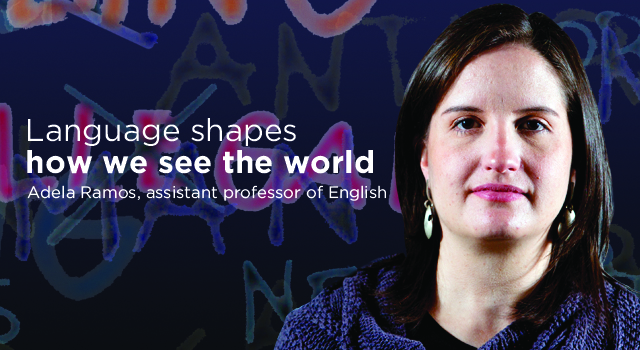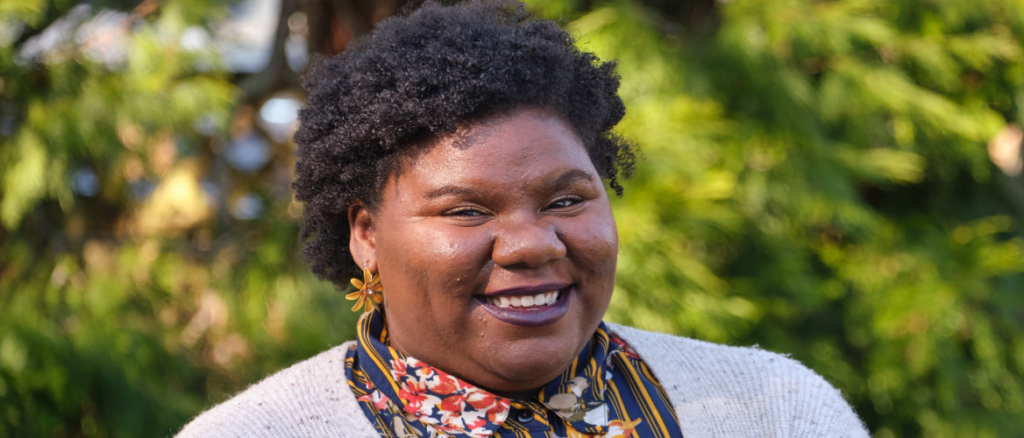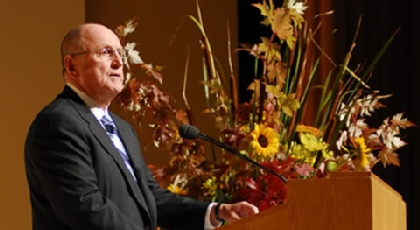Page 271 • (4,983 results in 1.603 seconds)
-

language,” Ramos said. The field of studies she draws from is critical animal studies with a focus in “anthropomorphism” – the attribution of human characteristics and purposes to inanimate objects animals, plants or pretty much anything that isn’t human. She also focuses on its counterpart “animalization,” which is the attribution of animal behaviors – like crawling – to human beings. It wasn’t long before Ramos noticed how often descriptions used to describe animals are attributed to humans to
-

surrounding sexual assault and abuse. What are some goals you have for your role? I hope to continue the legacy of those set before me. I hope to also encourage the CGE to be a more utilized place, especially for people of color. Tell us about your current graduate studies. I will graduate with my master’s in public administration from The Evergreen State College in June. It has been quite the journey. I am excited for my capstone, for which my team will be writing self-empowerment curriculum in both
-
Genocide Studies Powell-Heller Conference for Holocaust Education Natalie Mayer Holocaust and Genocide Studies Lecture Annual Raphael Lemkin Lecture Kurt Mayer Summer Scholars and Lemkin Essay contest Gender, Sexuality, and Race Studies The Department of Religion Courses throughout history, political science, english, social work, and more. Campus LifePLU is committed to creating inclusive living communities that foster a sense of belonging and comfort for all students. Residential Life at PLU
-
depredation. Thus, a Lutheran education is inextricably linked to promoting life, health, and wholeness for others, other-than-human creatures, and the earth itself. Our commitment to the promotion of peace and a just and sustainable society flows from such a commitment to wholeness. Read more … Editor: Dr. Samuel Torvend, University Chair in Lutheran Studies Contributors: Dr. Lynn Hunnicutt (Economics), Dr. Doug Oakman (Religion), the Rev. Dennis Sepper (University Pastor), Dr. Samuel Torvend (Lutheran
-
Indigenous LearningMission:Native American and Indigenous Studies is an interdisciplinary program grounded in a partnership between students, faculty, staff and local communities, with a global Indigenous focus centered in local and regional contexts. We empower students to recognize, honor and value Indigenous ways of knowing, so that they can work in collaboration with Indigenous communities and all their relations. The Native American and Indigenous Studies minor combines NAIS courses with
-

to $80 million of last week. Project Access reached its $1 million goal. – New endowed chairs in Holocaust Studies and Elementary Education, as well as an endowed professorship in Lutheran studies were established last year. – The campus has grown with new facilities, like the Martin J. Neeb Center – the new home of KPLU. The building is LEED Gold certified, which is the third building at PLU to receive such certification. Buildings that make up the university’s heritage, like Eastvold, have
-

and Dean of Graduate and Summer Studies in 1975. He was recognized with an Excellence in the Arts award from the university in 1988 for becoming “a champion for the education, support and advocacy of all the art disciplines; the creative processes that reflect most honestly the human spirit.” During his time at PLU, Dick helped make the university’s School of Arts one of the best in the region, working with the chairs of art, music and theater departments, hiring excellent faculty and bringing
-
classroom learning to their future career paths,” says Luther. “As a major with direct connections to criminal justice-related careers, we see the internship requirement as a way to help students gain work experience, network, and further discern their vocation.” Program faculty expect that many criminal justice students will double major, combining their criminal justice studies with a second major that will enhance their potential service impact. Such double majors may include social work, Hispanic
-

. in Xavier 201. About the Author: Joshua L. Reid was born and raised in Washington and is a registered member of the Snohomish Indian Nation. Reid is currently an associate professor of American Indian Studies and the John Calhoun Smith Memorial Endowed Associate Professor of History at the University of Washington. Reid’s presentation is titled “Makah Voices and the Sea” and will be related to his inaugral book “The Sea is my Country.” This award-winning book explores the Makahs, a tribal nation
-
O’Brien, Associate Professor of Religion and Culture, PLU This presentation explores the origins and developments of the Jewish Healing Movement. Shaped by interreligious conversation and dialog, this grassroots effort within mainstream Jewish communities has led to the creation of systems of support and rituals of renewal for individuals, communities, and the suffering Earth. 2:00 p.m. – The Songs We Share Dr. Samuel Torvend, University Chair in Lutheran Studies at PLU, serves as host of this session
Do you have any feedback for us? If so, feel free to use our Feedback Form.


